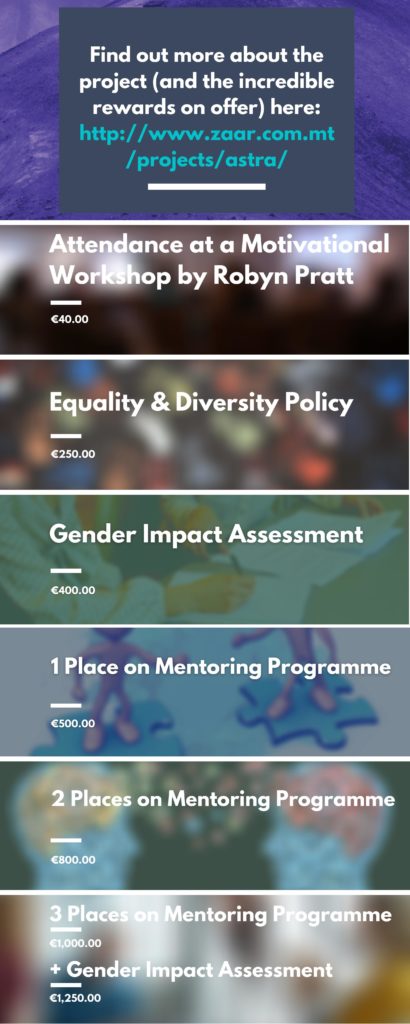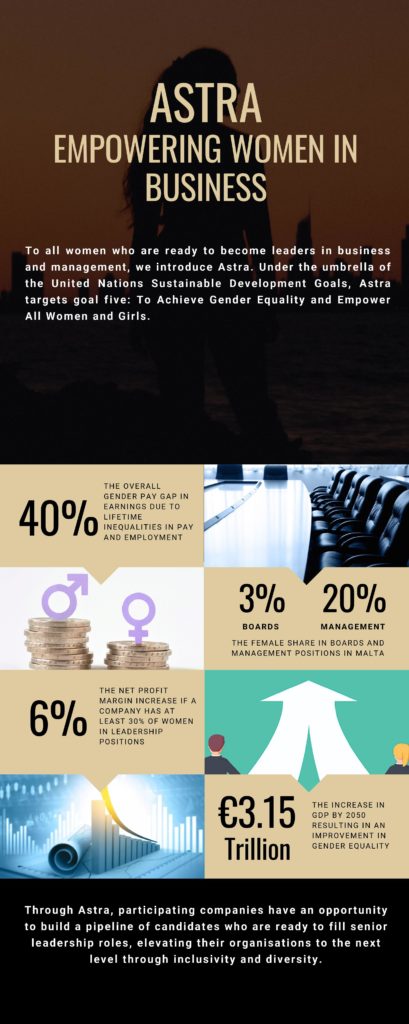Gender Equality is one of the 17 Sustainable Development Goals. Unfortunately, gender inequalities are present in almost all aspects of society in Malta, especially when it comes to leadership positions.
Statistics show that the amount of women on boards as well as in managerial positions is very low in Malta, even when compared to the rest of the EU. Studies have also shown that boards having at least one female member on them outperformed those that had no female representation.
Therefore, the main aim of this project will be to develop a mentoring programme specifically to nurture, support and empower promising leaders by specifically addressing the barriers and hurdles commonly faced by women at the workplace. The programme will consist of a mix of mentoring, coaching and training, and through the process, create a network of leaders who can support and empower each other.
The project will consist of several activities that will take place over the course of one year including desk research, the development of a mentoring journal and a manual and tools for mentors, workshops with focus groups, the delivery and filming of training sessions for mentors, monthly briefing sessions and a final dissemination event.
Priorities
A lack of women in decision-making positions is reflected in the failure to recognise people’s diverse needs across public policy in the EU and its Member States. Lifetime inequalities in pay and employment lead to an overall gender gap in earnings of some 40%.
Bringing more women into decision-making positions would enable Malta to use all the resources at its disposal and help ensure that everybody, regardless of gender, is able to help shape society.
Using well quoted data, Malta is more significantly underrepresented in both boards and management positions compared to the EU average. The female share equals 3.0% in Maltese boards (EU-27 average 14.0%) and 20.0% in management positions (EU-27 average 33.0%).
Board directors oversee the affairs of, and maximise a company’s and organisation’s business and strategy, by collectively directing their affairs and simultaneously meeting the interests of shareholders and stakeholders. These include business and financial issues such as determining the business and organisation strategies and plans, while ensuring that their structure and capability are appropriate for implementing chosen strategies. In addition to this, board directors will also be responsible for issues relating to governance, corporate social responsibility and ethics.
The question we need to ask therefore is “If a key role of a Board of Directors is to increase business and organisational performance, leading to maximising the entity’s value, why then are capable women not appointed to more boards in Malta despite the clear evidence?”
This project will, therefore, through the development of a mentoring programme, focus group meetings, briefing and monitoring sessions, and the development of a manual and tools, try to address this pressing concern. The above activities will help develop the necessary tools, skills and training that will pave the way for more women to feel more empowered and become leaders.
The key findings of a recent study by Kris Byron and Corinne Post show that firms with women on their
boards were more profitable. “Boards with female directors tend to make stronger efforts to monitor the firms. They spent more time in board meetings and were more likely to make efforts to monitor the CEO and the
firm in general.” It was also concluded that “boards with more female directors are more likely to be concerned with, and involved in, influencing the firm’s strategy.”
Thus, the main suggestion was that “efforts to ensure director accountability and to open educational and employment opportunities to women may provide the conditions that will motivate firms to select female directors for their performance-enhancing potential.”
The above findings can also be applied to voluntary organisations, where women on their boards will also make an NGO or institution more sustainable and more valuable.
The mentoring programme that will be developed by this project will first address the barriers and the obstacles commonly faced by women at the workplace, both in companies and in Voluntary Organisations. The programme will help nurture, support, and empower women in becoming promising leaders capable of being positive forces of change.
The benefits of mentoring are myriad. For individuals, studies show that good mentoring can lead to greater career success, including promotions, raises, and increased opportunities. Organisations that embrace mentoring are rewarded with higher levels of employee engagement, retention, and knowledge sharing.
The mentoring programme will be developed after a desk research on best practices and other successful programmes and their core features has been carried out. This programme will involve the development of a manual and tools for mentors, which will help the latter structure their mentoring journey. A series of focus groups and monitoring sessions will also help in updating the structure and content of the mentoring programme and manual. In addition to this, a training session will be held for mentors. This will be followed by recruitment of mentors, selection of mentees and the pairing of mentors with the chosen mentees. The programme will then be piloted over a 12-week period. A final dissemination event will then take place at the end of the project to present and promote the outcomes of the project and encourage more stakeholders to embrace mentoring within their organisational structure and strategy.
For this project, CORE Platform will be partnering with Weave Consulting, an entity inspired by the 17 UN SDGs and focused on helping forward thinking business leaders build profitable, purpose-driven sustainable companies and on creating a positive social impact.
The mentoring research study can be found here: https://www.yumpu.com/en/document/read/64537069/mentoring-research-ir


